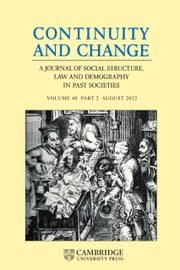No CrossRef data available.
Article contents
Britannic social histories – continuity and change
Published online by Cambridge University Press: 01 August 1997
Abstract
F. M. L. Thompson (ed.), The Cambridge social history of Britain, 1750–1950, Vol. I: Regions and communities; Vol. II: People and their environment; Vol. III: Social agencies and institutions. (Paperback edition, Cambridge: Cambridge University Press, 1993.) Pages xv+588; xv+373; xiii+492.
M. J. Daunton, Progress and poverty: an economic and social history of Britain 1700–1850. (Oxford: Oxford University Press, 1995.) Pages xvi+620.
Cormac Ó Gráda, Ireland: a new economic history, 1780–1939. (Oxford: Oxford University Press, 1994.) Pages xv+536.
What is social history and how should it be written? What are its ‘limits and divisions’ in the context of the ‘Britannic’ isles? F. M. L. Thompson, M. J. Daunton and Cormac Ó Gráda have provided important contributions, which will long survive the debate and reactions generated by their publications. These books are, in some respects, very different works, though they share a similar epistemological outlook based on ontological realism and empiricism. Together they offer a powerful and convincing alternative to the various versions of the ‘linguistic turn’ which has featured so prominently in the debate on social history in recent years.
The Cambridge social history (hereafter CSH) is a work of consolidation, a collective effort whose aim is ‘to communicate the fruits of…research…to the wider audience of students who are curious to know what the specialists have been doing and how their work fits into a general picture of the whole process of social change and development’. By contrast, Daunton and Ó Gráda have single-handedly produced inspiring analyses of crucial aspects of modern British and Irish history respectively. Daunton offers a nuanced discussion of the first industrial revolution. And, from a ‘new economic’ point of view, Ó Gráda reassesses the turning points in the making of contemporary Ireland, between the age of the American Revolution and the outbreak of World War II.
- Type
- Review Article
- Information
- Copyright
- © 1997 Cambridge University Press


